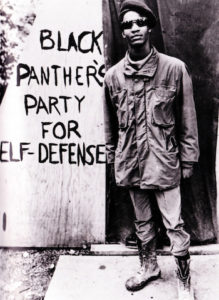
The Black Panther Party (BPP) was founded on this date in 1966. It was a Black political organization originally known as the Black Panther Party for Self-Defense.
The BPP originated in Oakland, California, and was founded by Huey Newton and Bobby Seale. The original six members of the Black Panthers included Elbert “Big Man” Howard, Sherwin Forte, Reggie Forte, Little Bobby Hutton, and Newton and Seale. They adopted the Black Panther symbol from an independent political party established by Black residents of Lowndes County, Alabama. The Panthers also supported the Black Power movement, which stressed racial dignity and self-reliance.
The Party established patrols in Black communities to monitor police activities and protect the residents from police brutality. The BPP combined elements of socialism and Black Nationalism. It promoted the development of strong Black-controlled institutions, calling for Blacks to work together to protect their rights and improve their economic and social conditions. The Panthers also emphasized class unity, criticizing the Black middle class for acting against the interests of other, less fortunate Blacks.
They welcomed alliances with white activists, such as the Students for a Democratic Society (SDS) and later the Weathermen, because they believed that all revolutionaries who wanted to change U. S. society should unite across racial lines. The BPP grew throughout the late 1960s and eventually had chapters nationwide. As racial tension increased around the country, the Federal Bureau of Investigation (FBI) blamed the Black Panthers for riots and other incidents of violence. Below are the original party members.

The bureau launched COINTELPRO (short for counterintelligence program), designed to disrupt efforts to unify Black militant groups such as SNCC and the Panthers. In December 1969, two Chicago leaders of the party, Fred Hampton and Mark Clark, were killed in a police raid. According to the party's attorney, 28 Panthers had been killed by the end of the decade, and many other members were either in jail or forced to leave the United States to avoid arrest. After Newton's conviction was reversed, he called for the development of survival programs in Black communities to build support for the BPP. These programs provided free breakfasts for children, established free medical clinics, helped the homeless find housing, and gave away free clothing and food.
This attempt to shift the party's direction did not prevent further external attacks and internal conflicts, and the party continued to decline as a political force. After the departure of Newton and Seale, the party's new leader, Elaine Brown, continued to emphasize community service programs. These programs were frequently organized and run by Black women, who were a majority in the party by the mid-1970s. The Panthers were no longer a political force by the end of the 1970s, weakened by external attacks, legal problems, and internal divisions.
Several Black women sustained the organizations' community programs throughout their decline until 1981 when the Oakland-based program closed in 1997. The Black Panther Party Research Project (BPPRP) was created to locate sources and develop finding aids to assist researchers. The general public continues to uncover information about the BPP, one of the twentieth century's most controversial yet least researched organizations.